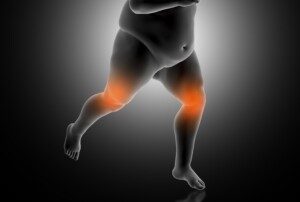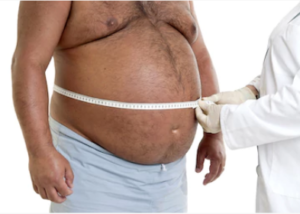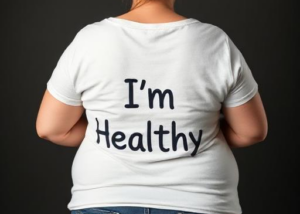
Just how many fat Americans die every year from weight stigma and fatphobia vs. the illnesses caused by obesity?
Can feeling shamed and unworthy really damage your body more than the actual obesity?
It’s being said with increasing frequency: “The anti-fat bias and discrimination that we feel causes way more harm to our health than does being overweight.” This is a very loaded assertion that deserves some investigation.
“Over the years I’ve seen an awful lot of obese people become ill and die prematurely, largely because of obesity related illness,” says Dr. David Beatty, MD, a retired general practitioner with 30+ years of experience and an instructor of general medicine for 20+ years.
Dr. Beatty continues, “I’ve never considered weight stigma or other peoples’ fatphobia to be a significant contributory factor.”
On the other hand, it’s no secret that anxiety and stress can cause an assortment of symptoms and ailments — and anxiety and stress can be caused by an individual’s perception of what is now commonly known as fatphobia, or its earlier descriptors of weight stigma and anti-fat bias.
Conditions Caused by Chronic Anxiety and Stress
- Tension headache
- Neck pain
- Elevated resting pulse
- Hair loss
- Acid reflux (which can lead to heartburn or a cough)
- Fatigue
- Heart palpitations
- Shortness of breath
- Chest pain
- High blood pressure
- Coronary artery disease
- Elevated blood sugar
- Cold hands
- Insomnia
- Burping
- Diarrhea
- Flare-up of a pre-existing condition such as inflammatory bowel disease or dermatitis
- Reduced immune function
- Back pain
Only two of these conditions jump out as being life-threatening: high blood pressure and coronary artery disease.
There’s no evidence that a chronically elevated resting heart rate in an obese person subtracts years from their life that their obesity already doesn’t.
It’s also a general consensus that stress-related heart palpitations are harmless in people with no underlying heart conditions.
Though reduced immune function sounds serious, this usually comes down to increased susceptibility to the common cold when the cause is stress/anxiety.
There simply is no science that supports the premise that faphobia is as dangerous, let alone more so, to an overweight person’s blood pressure and coronary arteries as is the actual obesity itself.
Dr. Beatty explains, “There are theoretical reasons why stress, from any cause, may contribute to hypertension and ischemic heart disease — but I feel that the physical damage done by prolonged obesity over many years is, by far and away, the crucial factor.”
The aforementioned list of conditions looks significant simply by its volume.
But check out the list of conditions below that weight stigma, anti-fat bias, fatphobia and fat shaming do NOT cause – but that obesity itself directly leads to or raises the risk for.
- Type 2 diabetes
- High cholesterol
- Clogged coronary arteries
- Chronic heart failure
- Blood clots
- Ischemic stroke
- Obstructive sleep apnea
- Acid reflux
- Hiatal hernia
- Gout
- Gallbladder disease
- Liver disease
- Osteoarthritis of the knee joint
- Difficulty getting pregnant
- Miscarriage
- Complications during pregnancy or giving birth
- Increased risk of complications from surgery
- Increased risk for some cancers
- Increased death and hospitalization rate from COVID-19
- Mobility impairment
This second group of conditions is far more threatening to the human body than is the first. And in ways you may not know!
For example, chronic acid reflux from obesity, rather than from feeling down-and-out from weight stigma, can lead to a precancerous condition in the esophagus.
Another example: Obstructive sleep apnea can, over time, impair the heart’s pumping ability. This in turn can cause kidney insufficiency.
In cases where obesity may not be the main cause of a condition (e.g., osteoarthritis from a past injury, or obstructive sleep apnea from a naturally large tongue base), it will surely worsen the situation.
Social Media: a Burning Hot Kitchen
It seems that the most prevalent realm where the so-called fatphobia exists is on social media.
Not only can a user expose herself to hundreds of nasty comments in just one hour (vs. how many in public?), but the comments will collectively be more ruthless, since offenders will post things that they’d never say to someone’s face.
The slew of fat-shaming comments, that leave users feeling unsettled about their body and self-worth, are often not even directed at them.
They may be directed towards a celebrity, an athlete or an influencer they follow.
They may even have no target, such as a general comment, “People can’t be healthy if they’re a hundred pounds overweight.”
However, if you’re allowing the heat in someone else’s kitchen to disturb you so much—you’ll want to ask yourself if maybe some mental health counseling isn’t in order.
For example, if a selfie of your favorite recording artist attracted a bunch of insults about her waistline, this should not upset you, let alone make you question your own value as a person. You should be neutral towards it.
This neutrality towards the heat in someone else’s kitchen is crucial for mental health management. In fact, this applies to your own kitchen as well.
As a writer, I’ve been subjected to many hateful comments — not about my body, but about my thinking.
I’ve seen “dumb article” and “poor article” many times. Instead of letting these online strangers rent free inside my head, I siphon new article ideas from their comments: more content material.
It’s all up to you whether or not to let an online stranger ruin your day.
Dr. Beatty also explains, “If someone is obese they will reduce their risk of obesity-related comorbidities if they lose weight.
“They will also suffer less from fatphobia and stigma regarding weight problems. So losing weight is a win-win answer to the problem.”
Living in a World that Doesn’t Fit Large Bodies
Though many overweight people accuse airlines, movie theatres and restaurants of being fatphobic because they can’t fit in the seats, this is not the same as voluntarily reading hundreds of “fatphobic” comments a week on social media. Stop venturing into that steaming hot kitchen.
The frustration of not being able to fit in amusement park ride seats, restaurant booths, symphony or university lecture hall seats, etc., can be aggravating.
There may be anxiety when a very heavy person takes a seat, as they wonder if it’ll break.
When clothing companies don’t carry one’s size in a really cool outfit, that can sting.
Nobody likes to be stared at when serving themselves at the all-you-can-eat buffet.
There may also be issues at doctor appointments. For the record, Kaiser Permanente provides seats of ample size in waiting rooms. But some medical offices don’t.
Doctor appointments can be stressful because the patient, no matter what reason they’re there, knows that the doctor will bring up their weight.
Getting dates can be tough. Creating the online dating profile can be nerve-racking. And then there’s the blind date from a dating site: “Will he not see past my size?”
There are comments from family, relatives and friends about weight. This can include nagging from a parent or spouse.
You get the picture. However, none of these situations, nor all of them together, can ever be more hazardous to one’s physical health than the actual obesity itself. Feeling depressed and shamed won’t smother your internal organs.
There is no way in this universe that the frustration of living in a “fatphobic” society can lead to obstructive sleep apnea, uterine or colon cancer, esophageal disease, chronic knee pain, quickly fatiguing from light exertion, difficulty climbing a staircase, gallbladder disease or an increased risk of serious complications from surgery, from giving birth or from SARS-CoV-2 (aka covid)!
“If influencers are telling obese people that fatphobia is causing more morbidity than their weight, they are absolutely wrong,” says Dr. Beatty.
“We should all take responsibility for our lifestyle and what we eat — and accept the consequences of our decisions.”
 Dr. Beatty has worked in primary medicine, surgery, accident and emergency, OBGYN, pediatrics and chronic disease management. He is the Doctor of Medicine for Strong Home Gym.
Dr. Beatty has worked in primary medicine, surgery, accident and emergency, OBGYN, pediatrics and chronic disease management. He is the Doctor of Medicine for Strong Home Gym.
 Lorra Garrick has been covering medical, fitness and cybersecurity topics for many years, having written thousands of articles for print magazines and websites, including as a ghostwriter. She’s also a former ACE-certified personal trainer.
Lorra Garrick has been covering medical, fitness and cybersecurity topics for many years, having written thousands of articles for print magazines and websites, including as a ghostwriter. She’s also a former ACE-certified personal trainer.
.









































